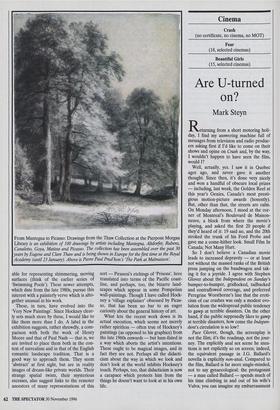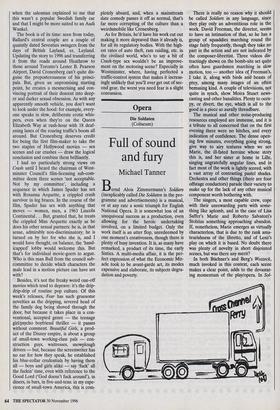Cinema
Crash (no certificate, no cinema, no MOT) Fear (18, selected cinemas) Beautiful Girls (15, selected cinemas)
Are U-turned on?
Mark Steyn
Returning from a short motoring holi- day, I find my answering machine full of messages from television and radio produc- ers asking first if I'd like to come on their shows and opine on Crash and, by the way, I wouldn't happen to have seen the film, would I?
Well, actually, yes. I saw it in Quebec ages ago, and never gave it another thought. Since then, it's done very nicely and won a handful of obscure local prizes — including, last week, the Golden Reel at this year's Genies, Canada's most presti- gious motion-picture awards (honestly). But, other than that, the streets are calm. On Monday afternoon, I stood at the cor- ner of Montreal's Boulevard de Maison- neuve, a block from where the movie's playing, and asked the first 20 people if they'd heard of it: 19 said no, and the 20th stroked the trunk of his Ford Probe and gave me a come-hither look. Small Film In Canada; Not Many Hurt.
So I don't believe a Canadian movie leads to increased depravity — or at least not without the massed ranks of the British press jumping on the bandwagon and tak- ing it for a joyride. I agree with Stephen Glover about the Independent on Sunday's bumper-to-bumper, gridlocked, tailbacked and contrafiowed coverage, and preferred Peregrine Worsthorne's line that the eroti- cism of car crashes was only a modest evo- lution from the widespread public tendency to gawp at terrible disasters. On the other hand, if the public supposedly likes to gawp at terrible disasters, how come the Indepen- dent's circulation is so low?
Pace Glover, though, the screenplay is not the film; it's the roadmap, not the jour- ney. The explicitly anal sex scene he men- tions is not explicitly so on screen; indeed, the equivalent passage in J.G. BaIlard's novella is explicitly non-anal. Compared to the film, Ballard is far more single-minded, not to say gynaecological: the protagonist — a man called Ballard — spends much of his time climbing in and out of his wife's Vulva; you can imagine my embarrassment when the salesman explained to me that this wasn't a popular Swedish family car and that I might be more suited to an Audi Wankel.
The book is of its time: seen from today, Ballard's central couple are a couple of quaintly dated Seventies swingers from the days of British Layland, er, Leyland. Updating the story to 1996 and transferring it from the roads around Heathrow to those around Toronto's Lester B. Pearson Airport, David Cronenberg can't quite dis- guise the preposterousness of his princi- pals. But, given an unpromising starting point, he creates a mesmerising and con- vincing portrait of their descent into deep- er and darker sexual obsession. As with any apparently smooth vehicle, you don't want to look under the hood: for example, every- one speaks in slow, deliberate erotic whis- pers, even when they're on the Queen Elizabeth Way at rush-hour with 18 deaf- ening lanes of the roaring traffic's boom all around. But Cronenberg deserves credit for being the first film-maker to take the two staples of Hollywood movies — sex scenes and car crashes — draw the logical conclusion and combine them brilliantly.
I had no particularly strong views on Crash until I heard the chairman of West- minster Council's film-licensing sub-com- mittee deem three scenes 'not acceptable. Not by my committee', including a sequence in which James Spader has sex with Rosanna Arquette, a crippled crash survivor in leg braces. In the course of the film, Spader has sex with anything that moves — women, men, a 1963 Lincoln Continental. But, granted that, he treats the crippled Miss Arquette exactly as he does his other sexual partners: he is, in that sense, admirably non-discriminatory; he is turned on by her for who she is, and I would have thought, on balance, the 'hand- icapped' lobby would welcome this. But that's for individual movie-goers to argue. Who is this man Bull from the council sub- committee to decide which characters the male lead in a motion picture can have sex with?
Besides, it's not the freaky weird one-off movies which tend to deprave: it's the drip- drip-drip of routine pop culture. Of this week's releases, Fear has such gruesome novelties as the dripping, severed head of the family dog being shoved through the door, but because it takes place in a con- ventional, accepted genre — the teenage girl/psycho boyfriend thriller — it passes without comment. Beautiful Girls, a prod- uct of the Disney empire, is about a group of small-town working-class pals — con- struction guys, waitresses, snowplough drivers — but, because the screenwriter has no ear for how they speak, he established his blue-collar credentials by having them all — boys and girls alike — say luck' all the fuckin' time, even with reference to the Good Lord (`God doesn't fuck around'), in diners, in bars, in five-and-tens: in my expe- rience of small-town America, this is corn- pletely absurd, and, when a mainstream date comedy passes it off as normal, that's far more corrupting of the culture than a weirdsmobile like Cronenberg.
As for Britain, he'd have his work cut out making it more depraved than it already is, for all its regulatory bodies. With the high- est rates of auto theft, ram raiding, etc. in the civilised world, who's to say a bit of Crash-type sex wouldn't be an improve- ment on the motoring scene? Especially in Westminster, where, having perfected a traffic-control system that makes it increas- ingly unlikely that you'll ever get out of sec- ond gear, the worst you need fear is a slight concussion.



















































































 Previous page
Previous page